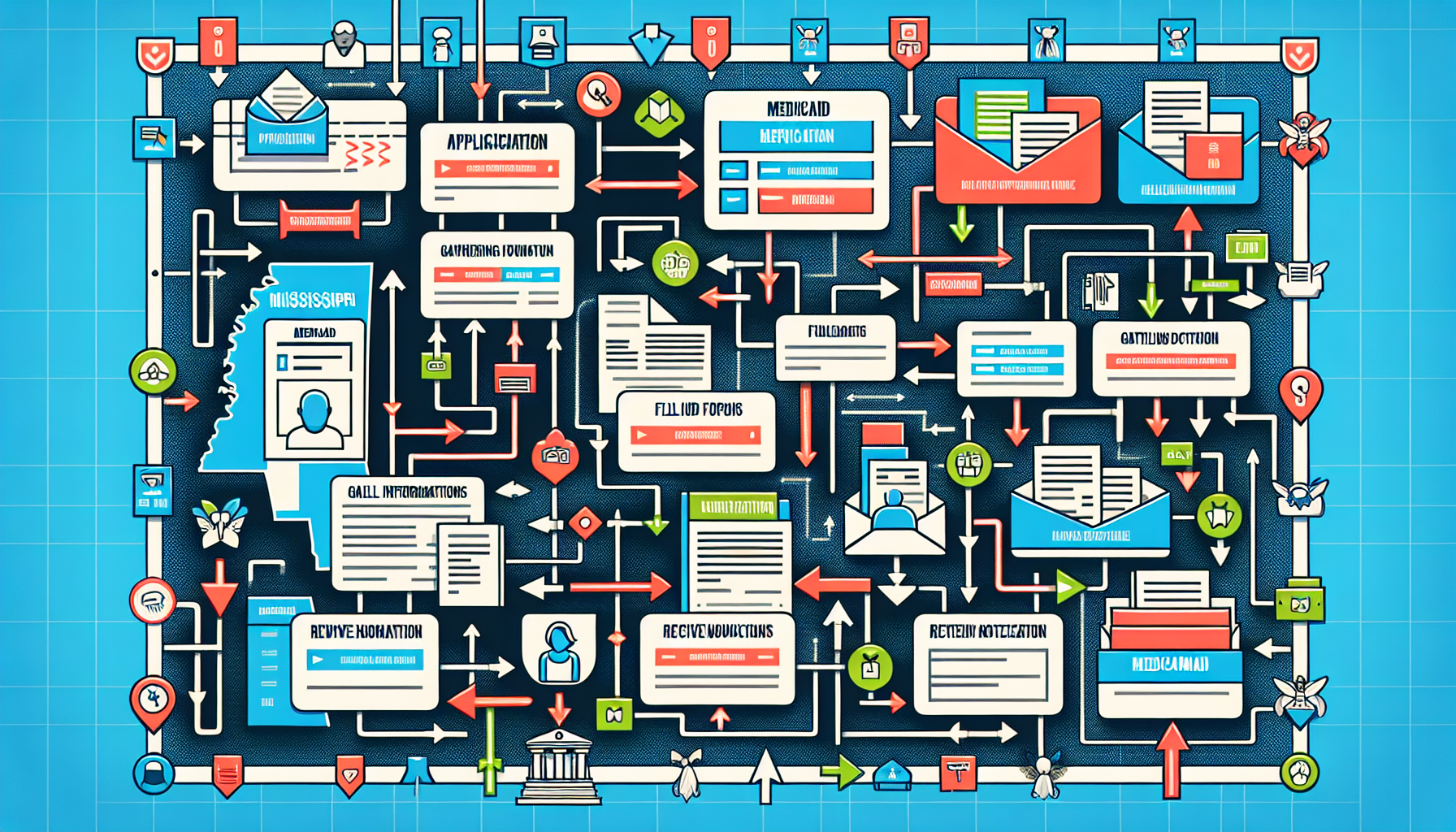Understanding Mississippi Medicaid Eligibility: Who Qualifies for Coverage?
Wondering if you qualify for Mississippi Medicaid eligibility? This comprehensive guide will walk you through the specific eligibility criteria, including income limits, household size, and special programs designed to help you get the coverage you need.
Key Takeaways
- Eligibility for Mississippi Medicaid is primarily determined by income limits based on the Federal Poverty Level, which varies by household size and specific demographics.
- Mississippi Medicaid offers various coverage types, including full benefits, limited programs, and Medicare cost-sharing options, catering to different health needs.
- Recent legislative efforts for Medicaid expansion face challenges, including failed bills and contentious work requirement proposals, leaving future coverage prospects uncertain.
Eligibility Criteria for Mississippi Medicaid

Determining eligibility for Mississippi Medicaid can feel like solving a complex puzzle; understanding the criteria helps simplify it. Medicaid is a vital healthcare program that provides necessary medical coverage to eligible individuals in Mississippi. Eligibility depends mainly on income limits set by the Federal Poverty Level, varying with household size.
These criteria help assess whether you or your loved ones qualify for Medicaid benefits. Various factors come into play, including income levels, family size, and specific needs. A clear understanding of these eligibility requirements is necessary to access the healthcare services you deserve.
Income Limits and Federal Poverty Level
Medicaid eligibility requirements differ by program and are revised annually based on the Federal Poverty Level (FPL). For instance, parents in Mississippi can qualify if their income is at 28% of the FPL, translating to about $7,230 annually for a family of three.
Children also fall under specific income limits. For example, children ages 6-18 are eligible if their family income is below the FPL, while those aged 1-6 can qualify if their family’s income is up to 133% of the FPL.
Pregnant women need an income under 194% of the FPL to qualify, illustrating the varied thresholds for different groups. These limits determine who can access Medicaid services in Mississippi.
Eligible Groups
Various groups are eligible for Medicaid in Mississippi. Low-income parents or caretakers with children under 18, deprived of support from one or both parents, can qualify. Custodial grandparents can also apply on behalf of their grandchildren.
Special programs exist for specific groups, such as the Disabled Child Living at Home program and the Perinatal High Risk Management program for pregnant women. SSI recipients and their dependents with established disabilities automatically qualify for other medicaid programs, ensuring they receive necessary health coverage.
Automatically Eligible Individuals
Some individuals qualify for Medicaid automatically, simplifying the coverage process. For instance, new legislation allows presumptive eligibility for pregnant women seeking Medicaid coverage for prenatal care, enabling them to receive necessary health services without delay.
Those who automatically qualify include SSI recipients and individuals who are aged, blind, or disabled. This automatic eligibility removes the burden of providing additional documentation, streamlining access to healthcare.
Types of Medicaid Coverage Available in Mississippi

Mississippi Medicaid offers various types of coverage to meet the diverse needs of its residents. Administered by the Mississippi Division of Medicaid, the program provides a range of healthcare services designed to improve access to medical care for eligible individuals.
Knowing the different types of Medicaid coverage available can help you make informed health insurance decisions. Mississippi Medicaid offers full benefits, limited programs, and Medicare cost-sharing options, catering to a wide array of health needs.
Full Medicaid Benefits
Full Medicaid benefits provide comprehensive coverage to eligible individuals in Mississippi. These benefits encompass essential medical services and hospital insurance, crucial for maintaining good health.
For example, fully eligible individuals can receive up to seven prescriptions per month, and minors under 21 can get eyeglasses reimbursed once a year. These benefits greatly improve access to necessary healthcare services, ensuring eligible individuals receive the care they need.
Limited Benefits Programs
Limited benefits programs address specific needs and offer targeted support. The Family Planning Waiver, for instance, is designed for individuals aged 13-44 and offers Medicaid benefits solely for family planning services, including annual exams.
The Healthier Mississippi Waiver targets individuals who do not qualify for Medicare. However, this waiver ends once the individual becomes eligible for Medicare, highlighting the program’s limited scope.
Medicare Cost Sharing Programs
Medicare cost-sharing programs help with Medicare premiums and certain out-of-pocket costs, making healthcare more affordable for eligible individuals. The Qualified Medicare Beneficiary (QMB) program, for instance, helps cover Medicare premiums and some out-of-pocket expenses for those enrolled in Medicare Part A.
Programs like the Specified Low-Income Medicare Beneficiary (SLMB) cover costs for those earning up to 135% of the FPL, while the QI-2 Program assists individuals with incomes between 135 to 175% of the FPL. These programs are essential in reducing the financial burden of healthcare costs for eligible individuals.
How to Apply for Medicaid in Mississippi

Applying for Medicaid in Mississippi can be straightforward with knowledge of the steps and requirements. The Mississippi Division of Medicaid offers several methods to apply, ensuring that the process is accessible to everyone.
Knowing the application process, required documentation, and specific enrollment steps for different age groups can help you navigate the system effectively and secure necessary Medicaid benefits.
Application Methods
There are multiple ways to apply for Medicaid in Mississippi. You can apply online at Access.ms.gov and upload necessary documents electronically.
Alternatively, applications can be submitted via the Mississippi Department of Medicaid’s website, by calling customer service, or by mailing or faxing PDF forms. You can also request a paper application to be mailed to you or apply in person at one of the 30 regional offices.
Required Documentation
When applying for Medicaid, providing the correct documentation is crucial. Required documents include personal identification, income verification, and proof of residency.
Accurate documentation ensures a smooth application process and timely access to Medicaid services.
Enrollment Process for Different Age Groups
The enrollment process depends on the applicant’s age. Individuals under 65 may follow different guidelines compared to those who are 65 or older or already receiving Medicare. Knowing these differences is vital for successful enrollment.
Specific steps and requirements must be followed to ensure eligibility and access to Medicaid benefits.
Recent Legislative Efforts and Changes

Recent years have witnessed significant legislative efforts to expand Medicaid in Mississippi. A bill directing the Division of Medicaid to seek expansion waivers was passed with a notable majority, indicating a growing interest in expanding healthcare access.
However, the path to Medicaid expansion has faced challenges, including disagreements over work requirements among lawmakers. These legislative efforts and changes profoundly impact Medicaid coverage in the state.
Failed Expansion Attempts
Efforts to expand Medicaid in Mississippi have faced significant hurdles. A notable House Bill aimed at expanding Medicaid with work requirements failed to pass, missing a critical deadline. Despite passing a bill directing the Division of Medicaid to seek expansion waivers, opposition from key political figures has stalled progress, leaving the future of Medicaid expansion uncertain.
Work Requirements Proposal
A contentious issue in the Medicaid expansion debate is the proposal to impose work requirements. These proposed regulations suggest that Medicaid enrollees must work 20 hours weekly, be full-time students, or participate in workforce training programs.
With nearly one in five Mississippi residents living in poverty, these work requirements could significantly impact low-income adults, making it harder for them to access necessary healthcare services.
Future Prospects for Medicaid Expansion
Medicaid expansion in Mississippi remains uncertain due to a divided Congress and political landscape. However, if expansion occurs, it could potentially cover an additional 200,000 individuals under the proposed guidelines.
This expansion could offer substantial benefits, including up to $1.2 billion in savings over five years and a net fiscal advantage of approximately $690 million over two years. Such financial incentives highlight the potential advantages of Medicaid expansion for the state.
Impact of Not Expanding Medicaid
The decision not to expand Medicaid in Mississippi carries far-reaching consequences. It has created significant healthcare coverage gaps, particularly affecting uninsured low-income adults.
The impact of this decision sheds light on broader implications for healthcare access, financial stability, and public health in Mississippi.
Coverage Gap for Uninsured Adults
The failure to expand Medicaid in Mississippi has created a substantial coverage gap. Approximately 123,000 uninsured adults could have gained coverage with expansion. This gap leaves many without access to necessary healthcare services, exacerbating the challenges faced by uninsured adults in the state.
Financial Implications
The financial implications of not expanding Medicaid are significant. Without expansion, uninsured adults face higher out-of-pocket costs and limited healthcare access. Additionally, Mississippi misses out on substantial federal funding, further straining the state’s healthcare system and affecting the wellbeing of its residents.
Healthcare Access and Affordability
The lack of Medicaid expansion impacts healthcare access and affordability for many in Mississippi. The health insurance coverage gap impacts uninsured adults who earn too much to qualify for traditional Medicaid but not enough to afford private insurance.
This situation causes significant financial losses for the state and increased healthcare costs, highlighting the urgent need for expanded coverage to improve public health and financial stability.
Summary
In summary, understanding Mississippi Medicaid eligibility is crucial for accessing necessary healthcare services. The eligibility criteria, types of coverage, application process, and legislative efforts all play a role in shaping the healthcare landscape in Mississippi.
Whether you are eligible for Medicaid or advocating for policy changes, staying informed and engaged can make a significant difference in ensuring better healthcare access for all.
Frequently Asked Questions
What are the income limits for Medicaid eligibility in Mississippi?
In Mississippi, Medicaid eligibility income limits vary by group: parents must earn no more than 28% of the Federal Poverty Level (FPL), children ages 1-6 can qualify at up to 133% of the FPL, and pregnant women must have an income under 194% of the FPL. It is essential to check specific eligibility criteria based on your circumstances.
Who qualifies for automatic Medicaid eligibility in Mississippi?
Individuals who qualify for automatic Medicaid eligibility in Mississippi include SSI recipients, the aged, blind, or disabled individuals, as well as pregnant women seeking prenatal care who may be presumptively eligible.
What types of Medicaid coverage are available in Mississippi?** **?
Mississippi Medicaid provides full benefits, limited benefits programs such as the Family Planning Waiver and the Healthier Mississippi Waiver, as well as Medicare cost-sharing programs. Individuals should assess their eligibility to determine the most appropriate coverage.
How can I apply for Medicaid in Mississippi?** **?
To apply for Medicaid in Mississippi, you can submit your application online at Access.ms.gov, by phone, or in person at one of the 30 regional offices. Ensure you have your personal identification, income verification, and proof of residency ready.
What has been the impact of not expanding Medicaid in Mississippi?** **?
The failure to expand Medicaid in Mississippi has resulted in a substantial coverage gap, leaving around 123,000 uninsured adults without essential healthcare services. This situation has also led to lost federal funding opportunities and increased healthcare costs for the state.








